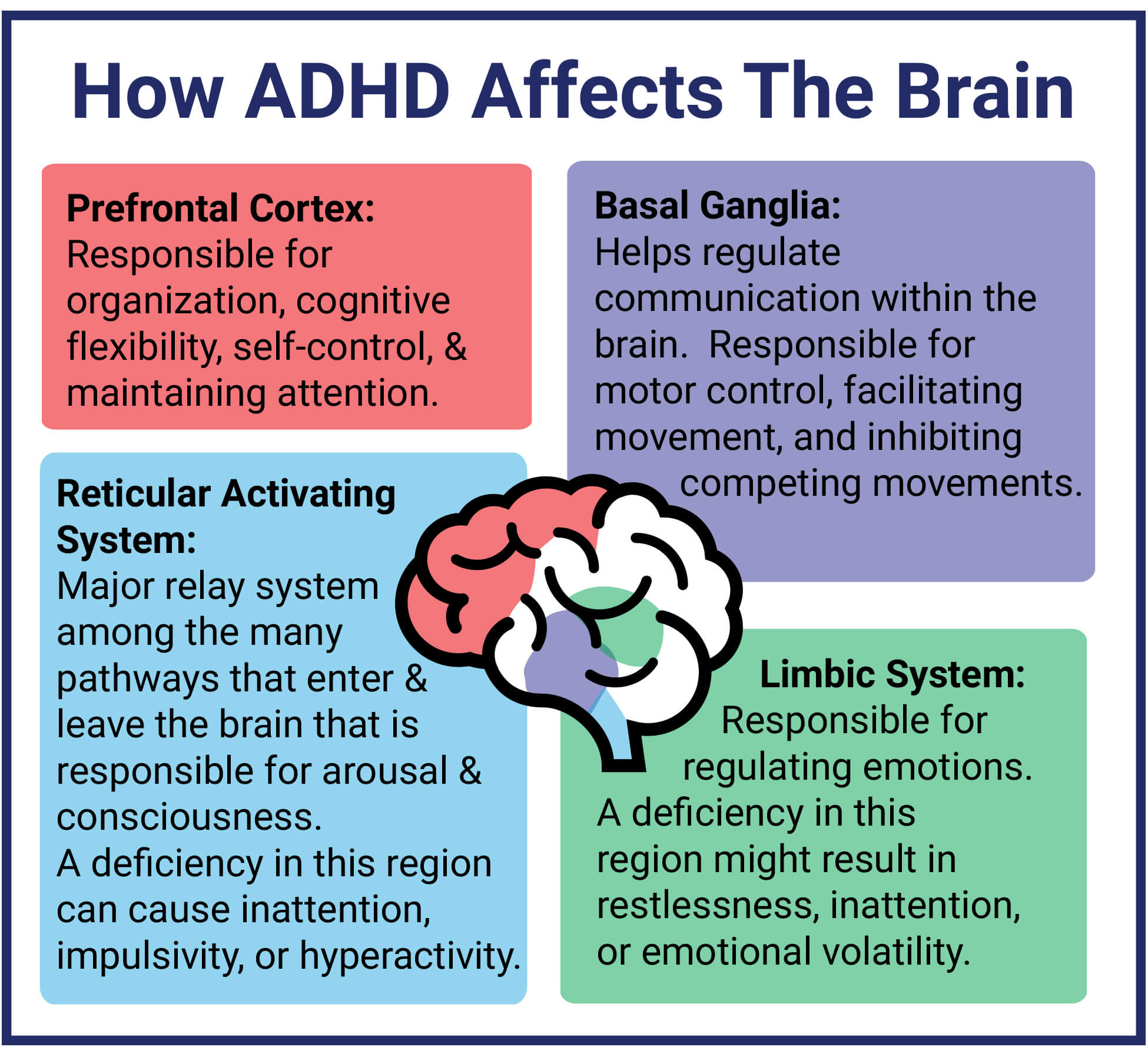Сan You Grow Out Of ADHD, Or It Stays In Adulthood?
Attention Deficit Hyperactivity Disorder (ADHD) is a common mental health issue that affects both adults and kids. The Centers for Disease Prevention and Control (CDC) estimate that 6.1 percent of children in the United States have been diagnosed with ADHD and that the condition impacts approximately 4.4 percent of adults. These statistics would suggest that as you mature, the severity and prevalence of ADHD behaviors might decline. And for some people, this is true. “But only about 10 percent of people really appear to grow out of ADHD”, says psychologist Margaret Sibley, associate professor of psychiatry and behavioral sciences at the University of Washington and Seattle Children’s Hospital. “Ninety percent still struggle with at least mild symptoms as adults — even if they have periods when they are symptom-free.” But can you really grow out of ADHD? Let’s find out how ADHD can change throughout your life.
What does ADHD look like?
If you were diagnosed as a child with ADHD, chances are your symptoms have changed over time. Hyperactivity tends to wane with age, often changing to an inner restlessness that’s not obvious to a casual observer. Signs can be frequently checking the time during a boring meeting or talking excessively but in a more latent manner than constantly interrupting like in childhood. Inattentive symptoms can be more persistent and obvious, such as making mistakes on a job. And, when it comes to forgetfulness, it could be failing to pay bills or constantly losing keys or glasses. While a child may wear out friends and have difficulty keeping them, an adult with ADHD may experience divorce.
Both genetics and lifestyle factors play a role in who’s likely to get ADHD. There’s a large genetic contribution, but genes are only expressed by interaction with the environment, including lifestyle choices. Some genes may make you more vulnerable to toxins or sensitive to certain foods or additives. Others may make you more sensitive to disruption of the sleep cycle and/or the blue light emitted by electronic screens. Sleep deprivation can mimic ADHD and worsen already-present ADHD, as can lack exercise and nutritional insufficiencies.

Can you outgrow ADHD?
ADHD is not necessarily something that you outgrow. ADHD behaviors are connected to the typical development stages of youth, adolescence, and adulthood. Just as a child’s behavior changes as they age, and they learn different behaviors appropriate to different environments, so too do the outward behaviors associated with ADHD change in response to new stimuli. It’s also possible that you may no longer fit the criteria for a formal ADHD diagnosis as you age. But that doesn’t always mean that all of your ADHD-associated behaviors will go away. And in some cases, you may not receive an ADHD diagnosis until later in life or never receive one at all.
Research shows that if you didn’t have ADHD as a child, it’s highly unlikely that as an adult you’re suddenly experiencing it. Some authors have claimed a substantial number of adult-onset ADHD cases, but that’s doubtful. It’s more likely the diagnosis was missed in childhood because the symptoms weren’t as obvious or these children had superior intelligence, allowing them to function in school despite undiagnosed ADHD.
Children
Children tend to receive an ADHD diagnosis around age 7. Behaviors associated with ADHD tend to become noticeable during the elementary school years, and include:
- inability to focus
- difficulty staying on task
- physical restlessness
Primary school years also tend to be when children are the most restless and have difficulty focusing even without ADHD, especially as they transition from a home environment into a group environment like a classroom.
Some physiological differences have also been noted in children with ADHD. The pre-frontal cortex, a part of your brain that helps you plan and pay attention, has been shown to be smaller in at least one study of children with ADHD. But the pre-frontal cortex has not been found to be smaller in adults with ADHD.
This is thought to result from children with ADHD having a pre-frontal cortex that is developmentally 2 to 3 years behind their peers. But as children grow older, the pre-frontal cortex matures. By around age 25, the pre-frontal cortex is typically fully developed. This means that it’s possible for people with ADHD to “catch up” developmentally once they reach adulthood. This could partly explain why ADHD behaviors may seem less noticeable for people as they age.

Adults
As you grow older, you may find that your ADHD-associated behaviors aren’t as noticeable. This could be due in part to developing coping mechanisms that “mask” your behaviors. Your impulse control, restlessness, and ability to focus will also typically improve as you age as a result of learning the rules and structures of different environments. This can also downplay the presence of ADHD behaviors.
But even if your behaviors are harder for others to notice, this doesn’t mean that you no longer experience the external and internal characteristics of ADHD yourself. Researchers are increasingly discovering that ADHD behaviors can continue well into adulthood, even if they are sometimes harder to detect as a person grows older.
And while it would appear that many people do experience less adversity related to ADHD as they age, more research is needed to understand how ADHD impacts the adult brain.
ADHD Treatment
Treatments for ADHD can vary according to your age and individual support needs. Treatment for adult ADHD typically involves medication, psychotherapy, and/or psychoeducation. There is no cure for ADHD, but a combination of these treatments can effectively reduce symptoms and improve work and home life.

Treating ADHD in children
Current CDC guidanceTrusted Source for treating ADHD in children includes:
- Behavioral therapy by a professional to manage symptoms. These therapies are first-line treatments for children 6 and under in whom side effects of certain medications have yet to be well-studied.
- Parental training in ADHD-behavior interventions so parents can learn to receptive to their children’s support needs.
- Support from educational professionals, such as a child’s teacher, to provide ADHD accommodations in classrooms or other environments.
- Stimulant medications, such as Adderall and Dexedrine, that modulate the hormones dopamine and norepinephrine to increase concentration.
- Non-stimulant medications, such as Guanfacine, to address memory issues or disruptive behaviors.
Dosage recommendations and side effects differ between children and adults.
Treating ADHD in Adults
Managing ADHD symptoms looks different when you are an adult. Many of the same strategies are used, such as stimulant or non-stimulant medications.
Behavioral interventions, such as cognitive-behavioral therapy, may also be recommended.
Because parents or classroom support staff aren’t typically present to reinforce behavioral interventions or treatments, you may opt to live with a support person. This person isn’t usually a medical professional but rather a person you trust who lives with you to help address daily tasks.
Conclusions
It was once thought that children simply outgrow ADHD as they develop, mature, and age. We now know that although ADHD begins in childhood, troubling symptoms can continue into adolescence and beyond—throughout a person’s life. While some kids may seem to outgrow the disorder (or no longer have symptoms that result in impairment), in most cases kids with ADHD grow up to be adults with ADHD. Hence it is a myth to assert that all children having ADHD will grow out of it.
Many successful people and celebrities live with ADHD. For example, Simone Biles, Michael Phelps, Karina Smirnoff, Justin Timberlake, Paris Hilton, and many others. These celebrities are proof that a mental health disorder doesn’t have to be a reason for not living a full, happy life. These well-known figures, as well as other many less-famous folks, have found ways to thrive with ADHD. You need to find a right treatment center, develop a treatment plan that works and stick to it.
Free Onlinr ADHD Test In 5 Min
Attention deficit hyperactivity disorder (ADHD) is a common neurodevelopmental condition that can affect how you think, process emotions, and respond to your environment. Though this condition is commonly diagnosed in children and teens, it can be diagnosed in adults, too. Not everyone has the same symptoms or experiences ADHD in the same way. ADHD can look different for everyone. For example, symptoms of ADHD in children might look and feel different than in adults. Your symptoms will also depend on the type of ADHD you have. The major symptoms of ADHD include inattention and hyperactivity or impulsivity.
WHO IS THIS ADHD TEST & SELF-ASSESSMENT FOR?
This simple assessment is for adults who think they may have symptoms of attention deficit hyperactivity disorder (ADHD). Please read each question carefully, and indicate how often you have experienced the same or similar challenges in the past few months.
HOW ACCURATE IS THIS ADHD TEST & SELF-ASSESSMENT?
This quiz is NOT a diagnostic tool. Mental health disorders can only be diagnosed by qualified mental health professionals.
We believe assessments can be a valuable first step toward getting treatment. All too often people stop short of seeking help out of fear their concerns aren’t legitimate or severe enough to warrant professional intervention.


Treatments for ADHD can vary according to your age and individual support needs. Treatment for adult ADHD typically involves medication, psychotherapy, and/or psychoeducation. There is no cure for ADHD, but a combination of these treatments can effectively reduce symptoms and improve work and home life. Many successful people and celebrities live with ADHD. For example, Simone Biles, Michael Phelps, Karina Smirnoff, Justin Timberlake, Paris Hilton, and many others. These celebrities are proof that a mental health disorder doesn’t have to be a reason for not living a full, happy life. These well-known figures, as well as other many less-famous folks, have found ways to thrive with ADHD. You need to find the right treatment center, develop a treatment plan that works and stick to it.
Published: April 01, 2022
Last Updated: February 17, 2023

Published: February 20, 2026
IOP Program for Depression
Summary: Depression is one of the most common mental health conditions in the United States, affecting an estimated 21 million adults each year. It causes persistent changes in mood, energy, motivation, sleep, and concentration that interfere with daily functioning, work, and relationships. IOP program for depression provides structured, evidence-based treatment — including individual therapy, group […]
Read more
Published: February 05, 2026
Intensive Outpatient Program for Anxiety
Summary: Anxiety disorders are the most common mental health conditions in the United States, affecting an estimated 40 million adults each year according to the National Institute of Mental Health. While temporary anxiety is a normal response to stress, anxiety disorders involve persistent, excessive worry and fear that interfere with daily functioning, relationships, and quality […]
Read more
Published: January 26, 2026
OCD vs. Autism: Understanding the Differences
Obsessive-compulsive disorder (OCD) and autism spectrum disorder (ASD) are often confused with one another. Both can involve repetitive behaviors, rigid routines, sensory sensitivities, and distress when things feel “off.” From the outside, the overlap can look striking. But in clinical treatment, the why behind those behaviors matters just as much as the behaviors themselves. At […]
Read more
